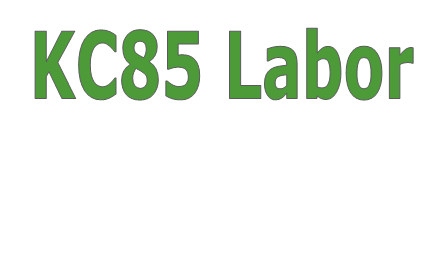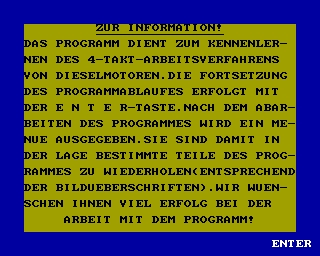- Details
- Geschrieben von Super User
- Hauptkategorie: Magazines
- Kategorie: CFOG's PIP
- Veröffentlicht: 30. November 1987
- Zugriffe: 28644
CFOG's PIP, February 1988, Volume 7 No. 1, Whole No. 63, page 2
V-Spell: Some More Comments; and Some Comments on The Word Plus
by Benjamin H. Cohen
Copyright 1987 by Benjamin H. Cohen. All rights reserved.
I reviewed V-Spell ($79.95, for both CP/M and MS-DOS systems from CompuView Products, Inc., 1955 Pauline Boulevard, Suite 200, Ann Arbor, MI 48103, 313-996-1299) in the July 1986 issue of PIP. Since then I have acquired a Kaypro 10. As I noted before, using V-Spell with an Osborne single-sided floppy disk system was less than great since the program and word list would not fit one disk. With a hard disk I decided I'd try out V-Spell again. In the meantime, of course, the release of WordStar 4 brought a new word list for The Word Plus, now bundled with WordStar 4 (as it used to be bundled with NewWord).
One item of terminology ought to be pointed out at the very beginning. Both programs (and all currently available spelling checkers that I am aware of) refer to their word lists as dictionaries. They aren't, they are just lists of words.
The word lists are closer to each other in size now: THE WORD PLUS's word list is 1089 records or 137K bytes while VSPELL's is 1220 records or 153K bytes. But the difference in size doesn't really account for the differences in words listed or speed of operation. When I ran both programs against a part of the PC-File 80 User's Guide V-SPELL took 1:18 against 45 seconds for THE WORD PLUS. But the time to check the file against the word list is only half of the story: if one program finds a lot more non-match words that are in fact correctly spelled, YOU will spend a lot more time telling the program to ignore (or in the case of THE WORD PLUS to discard) or add the words to the word list, not to mention the time you'll spend looking at a hard copy dictionary to make sure that some words are really correct and simply not in the program's word list. If one program gives a lot more 'false hits', words that are correctly spelled but not in its word list, you'll lose more time telling the program to ignore them or add them to a supplemental word list than you would with the program that took longer to do the check in the initial stage.
The file checked contains about 3300 - 3500 words. The reason it's hard to be sure is that it's filled with codes for Magic Print, and different word counting programs gave widely varying counts. Suffice it to say that the codes did not confuse either THE WORD PLUS or V-SPELL.
There were a number of words that both programs listed as mismatches. These included three that were typographical errors. Most of the rest of the words that were on both lists were proper nouns, names like PC-File and KaftorWare that no word list would be likely to have. There were two words that V-SPELL called mismatches that weren't on THE WORD PLUS's list: Ben and Kodak.
The following 24 words were on THE WORD PLUS's list of mismatches but not on V-SPELL's: ASCII, backspacing, clone, cloned, Cohen, copiers, databases, Dietrich, DOS, Inc., LaserJet, MailMerge, Mb, Microsoft, Mr., Ms, Osborne, Packard, PC, printers, spreadsheet, spreadsheets, typeset, wildcard. The remarkable thing is the number of proper nouns obviously included in the V-SPELL word list. At the same time some common words like printers and typeset were not in THE WORD PLUS's word list. Most notably, THE WORD PLUS still shows its old failing: it lacks plurals of many common nouns that it has in its word list. Just making up a list of common words out of my head, I found the following words that were in THE WORD PLUS's word list but only in singular form, not as plurals: bookkeeper, copier, database, davenport, laser, printer, petunia and plumber. TV wasn't in the list, but was in V-SPELL's list. Petunia, on the other hand, was missing from the V-SPELL list.
I made one other comparison: I grabbed the Random House Dictionary, Concise Edition (paperback), from a nearby shelf and entered just about all the words from two adjacent pages. A number of words were missing in both word lists: housemen, *housings, *hovels, howler, howlers, hoyle, *hubbubs, *huckleberrys, hud, *huffs *hugs, *hulls. The asterisk in front of seven words indicates that the singular was in each program's word list but not the plural.
But an even larger number of words were missing from THE WORD PLUS's list only (there were no words in THE WORD PLUS's list that weren't in V-SPELL's list): *houselights, housemaid, housemaids, houseman, *housetops, housewarming, housewarmings, *howdahs, hoyden, huarache, huaraches, hubcap, hubcaps, *hucksters, *huddles. The asterisk again indicates the five words of which the singular was in THE WORD PLUS's list, but not the plural.
There are other differences between the two programs. THE WORD PLUS allows you to have a general supplemental word list and a supplemental word list for the particular file (or group of files) and will check both. V-SPELL will only check one supplemental word list. On the other hand, V-SPELL allows you to add your supplemental word list to the main word list. You won't want to do this every day, but you can do it periodically whenever the supplemental word list grows too large. Indeed, you can create a supplemental word list with your word processor or editor if you want to add a lexicon of technical terms or proper names that you use frequently without having to go to the trouble of finding them in files. Of course it would be a big improvement if V-SPELL could recognize more than one supplemental word list.
Both THE WORD PLUS and V-SPELL can be used to globally hyphenate a file. This can be very useful for a long file since you can then reformat it and get the tightest and probably the best appearance without spending hours staring at the screen making hypnenation decisions. It's especially true since WS4 doesn't have a hyphenation algorithm at all. It just puts the cursor at the last character on the line and asks whether that's where you'd like to hyphenate. (If you don't believe me, just try it.) It's especially nice if you're using Magic Print which prepares true proportionally spaced justified text and will split words with soft hyphens as it prints. With fully hyphenated text you'll get much nicer looking text in general, though you may find some places where you'll have several lines in a row with hyphens at the end.
There's a big difference between V-SPELL's hyphenation and THE WORD PLUS's. THE WORD PLUS uses a hyphenation algorithm (i. e., rules about where to place hyphens in words) together with a file of exceptions, HYEXCEPT.TXT. You can edit the HYEXCEPT.TXT file with WordStar, so if you find that THE WORD PLUS's hyphenation gives you strange results on a particular word you can add it so that the next time THE WORD PLUS will get it the way you want. V-SPELL, on the other hand, has hyphenation in its word list. If the word is in the word list it will be hyphenated according to the word list; presumably correctly. If you don't like the hyphenation in the word list, you can add the same word, hyphenated the way you want it, to the supplemental word list. When you add the. supplemental word list to the main word list it will substitute your hyphenation for the one originally in the word list. Likewise, you can hyphenate all the words in the supplemental word list before you add them to the main word list, if you want to.
V-SPELL's 59 page manual has no index. The table of contents is sufficiently detailed that you can probably find what you are looking for quickly, so this is not a significant drawback. THE WORD PLUS's documentation is 57 pages following Appendix G to the WordStar 4 manual, and is included in the general index to that volume.
I haven't been using THE WORD PLUS or V-SPELL enough to make a final judgement as to which I prefer. Obviously, there are benefits to each one. I intend to do more spell checking in the coming months than I have done in the past (having a hard disk available makes this a lot easier to do) and I'll publish my conclusions sometime later. I suspect that for many users of WordStar 4 the mere fact that THE WORD PLUS is bundled with WS4 will be enough to discourage them from spending additional money for any other spelling checker, since despite it's shortcomings it does work. (Perhaps MicroPro, or more likely Software Heaven/Oasis Systems, the publishers of THE WORD PLUS, can be convinced to make the old THE WORD PLUS word list available for use by those who have single sided disks and can't profitably use the new bigger dictionary.)




